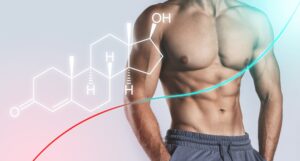In this short article, andropause will be discussed in detail, including the link between libido and andropause. In addition, we will explore the various natural remedies that can be used to reduce or eliminate some of the troublesome symptoms of andropause.
What is andropause?
Andropause, sometimes referred to as ‘male menopause’, typically occurs in older men and is usually triggered by a rapid drop in systemic testosterone levels. Testosterone is the main sex and reproductive hormone produced by the male body. The blood concentration of this substance, which is essential for stimulating essential internal functions such as bone, hair and muscle growth, red blood cell formation, the development and expansion of sexual organs and functions, and the promotion of libido (sexual desire), begins to decline after the age of 30. However, andropause, or “low-T” as this condition is sometimes called, does not always cause symptoms. When the symptoms of andropause do occur, it is usually after the age of forty or fifty.
It is important to know that andropause can be caused simply by the natural decline in hormone production or by a number of medical problems that negatively affect hormone levels. These include various diseases of the glands and organs that produce hormones, certain dietary errors, alcoholism, obesity, lack of exercise, certain prescribed medications, certain systemic diseases and smoking.
What are the symptoms of andropause?
The manifestations of andropause often vary from case to case and depend on various factors, such as the man’s age, the exact precipitating factors, his general health, his lifestyle habits and the severity of the underlying causes. Nevertheless, there are some common symptoms of T hypofunction that can occur in affected men. These include weight gain, increase in body fat, loss of muscle mass, weakening of bones, fatigue, mental and emotional symptoms such as anxiety and mood swings.
The link between reduced libido and andropause
Although these symptoms can be very troublesome and can lead to serious health problems such as osteoporosis and depression, many men find it most difficult to cope with the sexual problems that accompany decreased testosterone production, including sexual performance issues such as erectile dysfunction (ED) and the always troublesome decrease or complete lack of libido.
How is andropause treated?
Specific treatment protocols are often aimed at eliminating the underlying cause. However, if andropause cannot be linked to a medical disorder but is due to age and natural hormonal decline, testosterone replacement therapy is often used. Hormone replacement therapy can be administered in the form of gels, topical creams, oral preparations and injections.
Although some men have achieved some success in compensating for hormone deficiency with this form of treatment, some medical professionals believe that men with low T may achieve greater success with one or a combination of natural methods.
In addition, testosterone replacement therapy can pose certain health risks, including increased urination, water retention, skin conditions such as acne, elevated blood cholesterol levels, high blood pressure, sleep apnea and the formation of blood clots.
Natural methods to increase testosterone levels
There are numerous effective and natural methods to support healthy testosterone levels. Below are some of the most common solutions.
Reducing stress
Constant stress causes the body to produce “stress hormones” such as adrenaline and cortisol. Stress hormones cause other chemicals such as testosterone to drop. Highly stressed men are therefore advised to find a relaxing hobby and pursue this activity when tension is excessively high.
Get enough rest
Sufficient sleep enables the body to regulate its hormone balance on a daily basis. Disturbed sleep or lack of sleep can lead to an increase in the body’s production of stress hormones, interrupting the body’s attempt to restore its balance.
Monitoring medication
Many people don’t realize that various medications can lower testosterone levels in a man’s body. Anyone taking prescription medications who is struggling with andropause should disclose all of their medications to their doctor to determine if the medications they are taking could be a triggering factor.
Avoid bad habits
As mentioned earlier, vices such as drinking, smoking and recreational drug use are known to lower testosterone levels. Men affected by andropause who indulge in any of these habits are strongly advised to stop.
Exercise
Several scientific studies have shown that physically active men are more likely to increase testosterone levels than men who lead a sedentary lifestyle.
Eat a healthier diet
Scientific research has shown that a nutrient-rich diet can lead to increased testosterone production. In particular, doctors and nutritionists recommend eating foods that contain more healthy fats, carbohydrates and protein.
Use dietary supplements
Health experts advise men on andropause to support their diet with supplements, especially those containing vitamin D, magnesium, zinc and creatine.
Include natural plants and herbs
Plants and herbs that grow in nature and can be found all over the world often have testosterone and libido boosting properties. Some of these herbs include maca, saw palmetto, muira puama, ginseng and ginkgo biloba.

